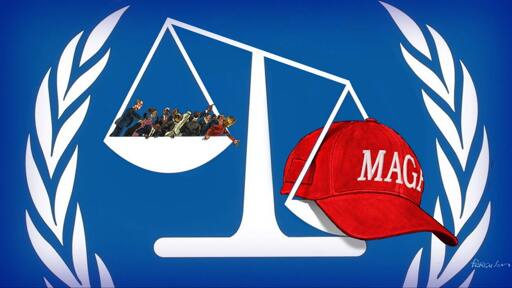The indictment of Benjamin Netanyahu and Yoav Gallant on war crimes charges is a disaster for Israel. It is also a huge problem for the western alliance.
Israel is getting full-throated bipartisan support in the US, as it attempts to fight off the International Criminal Court’s charges against its prime minister and former defence minister. But most governments in the EU, as well as Britain, Australia and Canada, are likely to respect the indictment. However reluctantly, they will have to arrest Netanyahu if he sets foot on their soil.
Even in normal times, this split between the US and its main allies would be very difficult. But these are far from normal times. Donald Trump, who will be president from January 20, has already pledged to take actions that are profoundly threatening to the interests of America’s friends.
Trump has promised to impose tariffs of 10-20 per cent, which will hit European and Asian exporters. His commitment to the Nato alliance is in doubt. And his plan for a peace deal with Russia could imperil the security of Europe.
Another bitter transatlantic confrontation — this time over Israel — is the last thing the western alliance needs. But that is what is coming.
Some Israeli ministers are already gleefully anticipating that the Trump administration will allow Israel to formally annex parts of the occupied West Bank and Gaza. That would be regarded as dangerous and illegal by the EU.
The Trump administration will almost certainly push through sanctions against the prosecutor and staff of the ICC. There is also talk in Republican circles of destroying the court, perhaps by threatening to sanction the countries that finance it. Japan, Germany, France and Britain are the four biggest donors to the ICC.
Neither Israel nor the US seems keen to engage in detail with the actual charges in the indictment, which include accusations that Israel has murdered civilians and used “starvation as a method of warfare”. Instead, the Trumpist right embraces Netanyahu’s claim that the ICC is driven by antisemitism. The fact that the court has also indicted Vladimir Putin, Hamas and numerous African leaders will be brushed aside as the court and its European backers are tarred as Jew-haters.
The reality is that most European governments have done a lot to support Israel since the Hamas atrocities of October 7 2023. Britain and France recently took part in military action to protect Israel against Iranian missiles.
Some EU countries, such as Germany, are so committed to Israel that they may break with the ICC despite accepting the court’s legitimacy. But the instinct of most European nations will be to combine support for Israel’s right to defend itself with support for an international legal system that enforces rules of war.
The issues at stake go beyond the immediate question of possible war crimes in Gaza. Most medium-sized democracies in Europe and Asia understand the dangers of reverting to a world where great powers and their clients act with impunity.
Some breaches of international law, such as defying a ruling by the World Trade Organization, do not sound too terrifying. But Russia has already demonstrated that defying international law can also mean seizing territory, abducting children and slaughtering civilians.
The legitimacy of the international campaign to deter Russian aggression is based on international law, with the ICC case against Putin as a centrepiece. If America, which hailed the indictment of Putin, now turns on the ICC — and the international legal order that it represents — then the chances of persuading a sceptical world to enforce sanctions against Russia or Iran or North Korea are severely diminished.
The emerging clash between the US and its allies over Israel is part of a much broader argument about the future of the world order. John Ikenberry of Princeton University argues that Trump is turning the US into a revisionist state that is challenging every element of the liberal international order it once built: free trade, openness to migration, multilateralism, security alliances, solidarity between democratic nations and the protection of human rights.
The ICC is a relatively recent addition to the international legal system. It only began operating in 2002. The US, Russia, China, India and Israel are not among the 124 countries that have accepted the court’s jurisdiction. But deliberately destroying it will send a dangerous message — at a time when authoritarian powers are increasingly confident about waging war and committing human rights abuses.
As the world’s most powerful country, America may feel that appealing to international law and institutions is something that only wimpy Europeans need to do. But even the mighty US needs allies and global rules.
The coalitions that America is constructing against Russia and China are built around an appeal to international law. The US has used legal justifications to bolster its pushback against China in the South China Sea and Russia in Ukraine. Even the Russians and the Chinese always try to claim that they are acting in accordance with global rules. They know that openly violating international law loses a country allies and opens it to sanctions.
International law can be frustrating and its operation can seem inconsistent. But a world without law will be a frightening and dangerous place.



I guess you didn’t spot the trap, then.
I guess you didn’t see the difference in the two things you wrote, then.